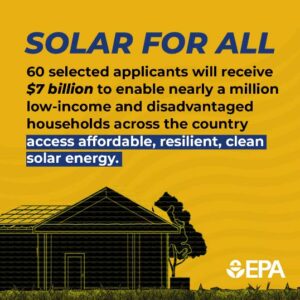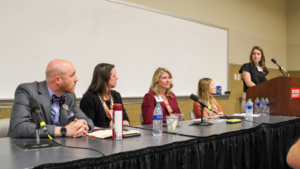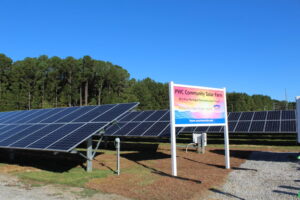EnergizeNC Coalition Set to Transform the Residential Solar Energy Market in North Carolina
 The North Carolina Clean Energy Technology Center (NCCETC), in collaboration with Advanced Energy and the North Carolina Clean Energy Fund, will be a part of the EnergizeNC coalition led by the North Carolina Department of Environmental Quality’s State Energy Office (SEO). This dynamic coalition secured $156,120,000 in Solar for All grant funding to revolutionize the energy landscape by enabling the swift deployment of distributed solar and associated weatherization upgrades.
The North Carolina Clean Energy Technology Center (NCCETC), in collaboration with Advanced Energy and the North Carolina Clean Energy Fund, will be a part of the EnergizeNC coalition led by the North Carolina Department of Environmental Quality’s State Energy Office (SEO). This dynamic coalition secured $156,120,000 in Solar for All grant funding to revolutionize the energy landscape by enabling the swift deployment of distributed solar and associated weatherization upgrades.
The EnergizeNC coalition is one of 60 applicants selected by the U.S. Environmental Protection Agency (EPA) to receive $7 billion in grant awards as part of the Solar for All program for states, territories, Tribal governments, municipalities and nonprofit organizations. This national initiative, powered by President Biden’s Investing in America agenda and the Inflation Reduction Act, epitomizes a collective commitment to advance environmental justice and mitigate the effects of climate change. To view the complete list of selected applicants, visit the EPA’s Greenhouse Gas Reduction Fund Solar for All website.
 Anticipated to provide residential solar installations to over 900,000 households nationwide, the Solar for All grants will fund sustainable solar programs tailored to empower low-income and disadvantaged communities. By facilitating the deployment and utilization of distributed residential solar systems, these initiatives aim to drive down energy expenses for families while concurrently fostering the creation of high-quality jobs in underserved areas.
Anticipated to provide residential solar installations to over 900,000 households nationwide, the Solar for All grants will fund sustainable solar programs tailored to empower low-income and disadvantaged communities. By facilitating the deployment and utilization of distributed residential solar systems, these initiatives aim to drive down energy expenses for families while concurrently fostering the creation of high-quality jobs in underserved areas.
Autumn Proudlove, Associate Director of Policy & Markets at NCCETC, sees this initiative as a transformative opportunity. “We’re hoping for the program to lead to more than just a temporary surge in solar installations,” she explained. “We’re laying the groundwork for continued growth in North Carolina’s solar market with the goal of delivering long-term benefits to our communities.”
“The recent announcement that North Carolina is set to receive $156 million to help with the continued proliferation of rooftop solar across the state is monumental for customers and rooftop solar installers alike. The state has seen a strong pent-up demand for clean energy technologies to help reduce customer utility bills and improve resiliency and this funding will only help to further accelerate the adoption of solar and storage for customers who stand to benefit the most,” said Matt Abele, Executive Director at the NC Sustainable Energy Association. “The introduction of Solar for All funding will mark a tremendous milestone in the trajectory for behind the meter technologies in the state moving forward.”
Demystifying Solar for All
 During the recent State Energy Conference of North Carolina, a panel delved into the intricacies of the Solar for All program. Moderated by Steve Kalland, NCCETC’s Executive Director, and Olivia Bretzius, Sustainability Consultant, the panel featured insights from industry experts including Claudia Cooper from Advanced Energy, Jen Weiss from the NC Clean Energy Fund, Vincent Potter from NCCETC, and Julie Woosley, Director of the SEO.
During the recent State Energy Conference of North Carolina, a panel delved into the intricacies of the Solar for All program. Moderated by Steve Kalland, NCCETC’s Executive Director, and Olivia Bretzius, Sustainability Consultant, the panel featured insights from industry experts including Claudia Cooper from Advanced Energy, Jen Weiss from the NC Clean Energy Fund, Vincent Potter from NCCETC, and Julie Woosley, Director of the SEO.
Julie Woosley shed light on the key objectives of the Solar for All initiative, emphasizing its alignment with the $27 billion Greenhouse Gas Reduction Fund authorized in the Inflation Reduction Act. The 60 selected applicants have committed to delivering on the three objectives of the Greenhouse Gas Reduction Fund: reducing climate and air pollution; delivering benefits to low-income and disadvantaged communities; and mobilizing financing to spur additional deployment of affordable solar energy.
“We see this program as a game changer for residential solar energy for everyone our state. This program will put solar energy within reach of many low- and moderate-income North Carolinians, allowing them to access the benefits of solar, including roof cooling, reduced utility bills, and improved air quality,” Woosely said. “It will also increase the number of energy sector jobs and could generate new solar businesses, including in areas that have not had significant solar investment to date.”
Jen Weiss highlighted the requirement set by the EPA for a 20% reduction in the average electricity bill for households benefiting from Solar for All funding. “We want to make sure that the benefits are reaching the people that need it the most,” she stressed.
Weiss also discussed the importance of building on existing statewide programs to maximize work already being done in North Carolina. “There are some really great solarize programs that are happening throughout the state, including right here in the Triangle,” Weiss said. “We want to leverage that, we want to learn from that, and we want to include that in our program.”
Weiss explained that this program challenges them to think creatively to find different ways to optimize existing methods of deploying solar. “How can we leverage larger installations of solar at a lower cost and really bring those benefits into communities, especially into rural communities?” she said.
Building on Past Work to Set the Stage
NCCETC brings a wealth of experience to the table, crucial for establishing a strong foundation for the EnergizeNC initiative. Demonstrating this expertise, NCCETC’s past projects have underscored the viability of community solar programs in North Carolina’s burgeoning solar economy.
One notable endeavor is the Community Solar for the Southeast Project, spearheaded by NCCETC from 2017 to 2020. Supported by the U.S. Department of Energy’s Solar Energy Evolution and Diffusion Studies – State Energy Strategies (SEEDSII-SES) funding program, this project provided technical assistance to nine cooperative and municipal utilities across the Southeastern U.S. Their mission? To evaluate the feasibility of implementing community solar and energy storage facilities at municipal utilities and electric cooperatives throughout the Southeast and work with these utilities to design and develop programs.
 Serving as a blueprint for similar utilities, the Fayetteville Public Works Commission Community Solar Program showcased the financial viability of pairing community solar with energy storage. Under this program, customers pay a monthly subscription fee and receive a bill credit for the solar’s value, minus operational costs. What’s remarkable is that all Fayetteville electric customers, regardless of ownership status or residential/non-residential classification, can participate as ‘subscribers.’
Serving as a blueprint for similar utilities, the Fayetteville Public Works Commission Community Solar Program showcased the financial viability of pairing community solar with energy storage. Under this program, customers pay a monthly subscription fee and receive a bill credit for the solar’s value, minus operational costs. What’s remarkable is that all Fayetteville electric customers, regardless of ownership status or residential/non-residential classification, can participate as ‘subscribers.’
In a further demonstration of commitment to equitable energy access, NCCETC played a pivotal role in distributing federal CARES Act funds on behalf of the North Carolina Department of Environmental Quality. These funds were allocated to provide community solar subscriptions to lower-income utility customers at four municipal and cooperative utilities in North Carolina.
One standout example is the Fayetteville PWC’s receipt of CARES Act Community Solar Access for Low and Moderate-Income Utility Customers funding in September 2021. Despite the program being fully subscribed, this funding enabled 26 eligible customers to participate in the Community Solar Program, ensuring inclusivity and accessibility in the transition to clean energy.
In 2022, NCCETC completed two projects focused on community solar access, as well as achieving resilience benefits for low and moderate-income communities. The projects – Community Solar Access for Low and Moderate-Income Utility Customers, and Achieving Resilience Benefits Through Utility Solar + Storage Deployment in Low-Income Communities – were focused on improving lower-income access to community solar energy within North Carolina by quantifying previously unaccounted for benefits, including those derived from battery energy storage.
EnergizeNC will also benefit from NCCETC’s experience with supporting community efforts to make it easier, faster and more affordable to go solar in their jurisdictions. NCCETC joined the Department of Energy’s 2021 challenge for 60 more communities to improve their local solar practices and be recognized through the SolSmart program, led by the led by the Interstate Renewable Energy Council (IREC) and the International City/County Management Association (ICMA) and funded by the U.S. Department of Energy (DOE) Solar Energy Technologies Office.
Staff at NCCETC focused on assisting local governments to expand solar energy use in Southeastern states, including North Carolina, South Carolina, Florida, Arkansas and Alabama. Through the process of earning their SolSmart designation, these communities made changes to their local processes to reduce barriers to installing a solar energy system. For local governments, this includes evaluating local permitting and inspection processes, in addition to planning and zoning rules.
NCCETC also operates the Database of State Incentives for Renewables and Efficiency© (DSIRE), the most comprehensive public source of information on incentives and policies that support renewable and energy efficiency in the United States. As part of the services offered through its extension, DSIRE Insight, NCCETC publishes The 50 States Report series, designed to keep industry stakeholders informed of the latest policy and regulatory developments in the clean energy sector. One of these quarterly reports includes The 50 States of Solar, which details distributed solar and rate design changes under consideration across the nation, including all state and utility actions related to net metering, distributed energy resource valuation, community solar programs, third-party solar ownership, and more.
With the collective expertise and commitment of the EnergizeNC coalition, alongside NCCETC’s rich portfolio of experience, North Carolina stands at the forefront of a solar market revolution. Through initiatives like Solar for All, we are not only driving tangible benefits for our communities today, but laying the groundwork for a sustainable and equitable energy future.